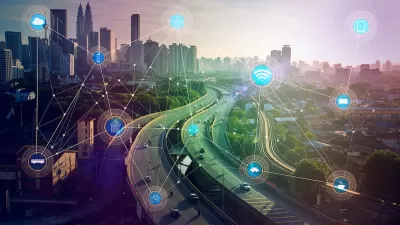It's easy to think of GPS technology as a personal navigation device, but the potential for a faster, cheaper GPS technology extends deep into the emerging Internet of Things.
Aarian Marshall reports on a breakthrough in GPS technology that will improve the performance of GPS for the masses—on their mobile phones, of course.
Marshall begins the article by noting that GPS technology is much more accurate than anyone who only uses a smart phone realizes:
Surveyors have used GPS to measure down to the centimeter for some time now. More precise GPS identifies signals at a higher frequency, called the carrier phase, but must use complex bits of mathematics to figure out locations. The problem is that this process is slow, and speeding it up to make it widely available to the public is expensive.
Enter Ray Farrell, a professor and electrical and computer engineering chair at the Bourns College of Engineering at the University of California, Riverside, who along with some colleagues published a paper in the journal IEEE, which describes a breakthrough in "[combining] GPS measurements with data from an inertial measurement unit, or IMU, which is an electronic device that can measure force and angular velocity."
Marshall describes in additional detail the technological advancement discovered by the team of engineers, but the notable result of their work: "very precise GPS just got a lot faster, and a lot cheaper." Beyond the personal applications possible with the new technology, Farrell and team focus mostly on the Internet of things: specifically the sensors that will be necessary to drive a fleet of automated vehicles.
FULL STORY: Super-Accurate GPS Just Got a Lot Cheaper and Faster

Maui's Vacation Rental Debate Turns Ugly
Verbal attacks, misinformation campaigns and fistfights plague a high-stakes debate to convert thousands of vacation rentals into long-term housing.

Planetizen Federal Action Tracker
A weekly monitor of how Trump’s orders and actions are impacting planners and planning in America.

San Francisco Suspends Traffic Calming Amidst Record Deaths
Citing “a challenging fiscal landscape,” the city will cease the program on the heels of 42 traffic deaths, including 24 pedestrians.

Defunct Pittsburgh Power Plant to Become Residential Tower
A decommissioned steam heat plant will be redeveloped into almost 100 affordable housing units.

Trump Prompts Restructuring of Transportation Research Board in “Unprecedented Overreach”
The TRB has eliminated more than half of its committees including those focused on climate, equity, and cities.

Amtrak Rolls Out New Orleans to Alabama “Mardi Gras” Train
The new service will operate morning and evening departures between Mobile and New Orleans.
Urban Design for Planners 1: Software Tools
This six-course series explores essential urban design concepts using open source software and equips planners with the tools they need to participate fully in the urban design process.
Planning for Universal Design
Learn the tools for implementing Universal Design in planning regulations.
Heyer Gruel & Associates PA
JM Goldson LLC
Custer County Colorado
City of Camden Redevelopment Agency
City of Astoria
Transportation Research & Education Center (TREC) at Portland State University
Jefferson Parish Government
Camden Redevelopment Agency
City of Claremont





























